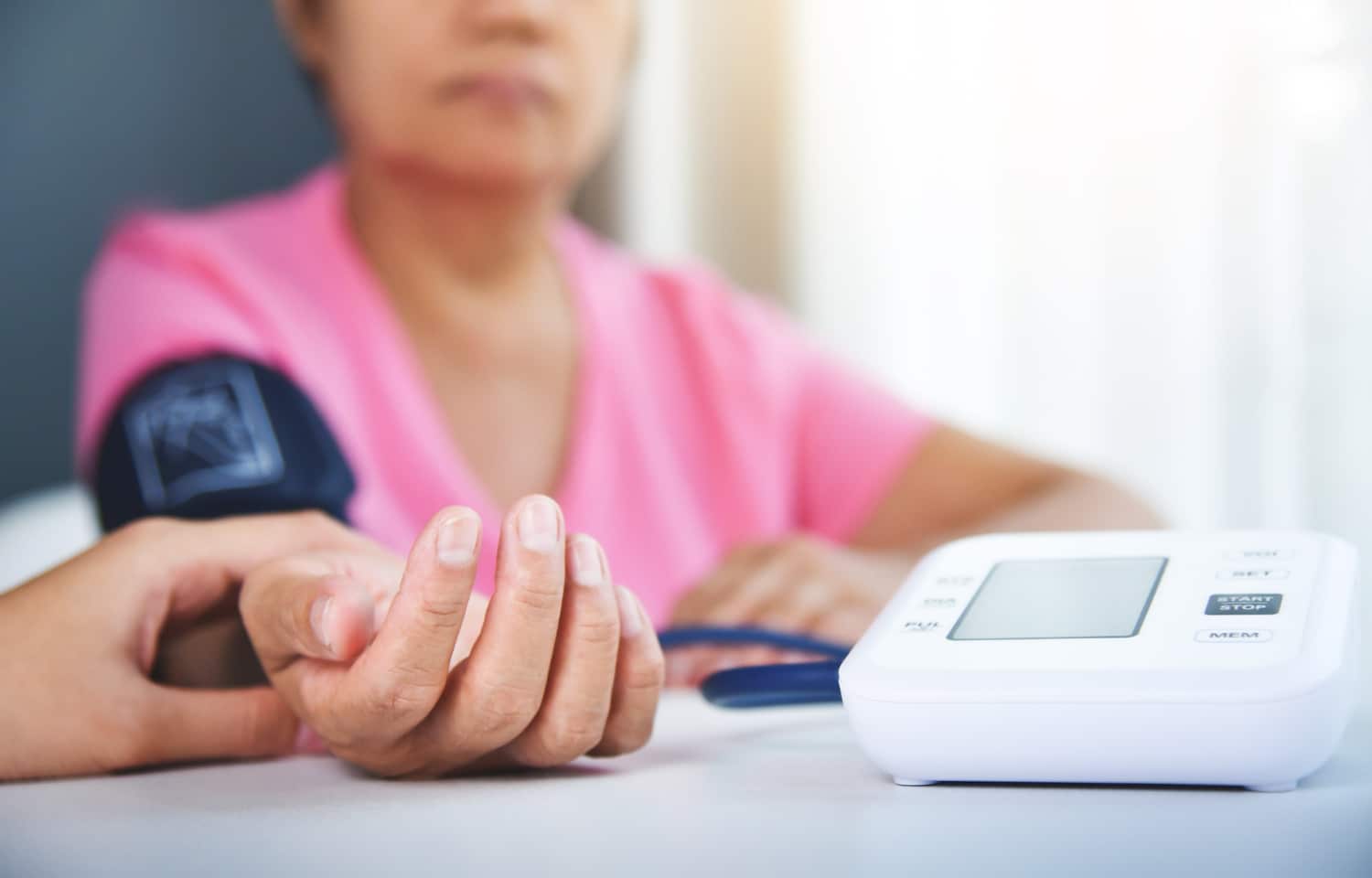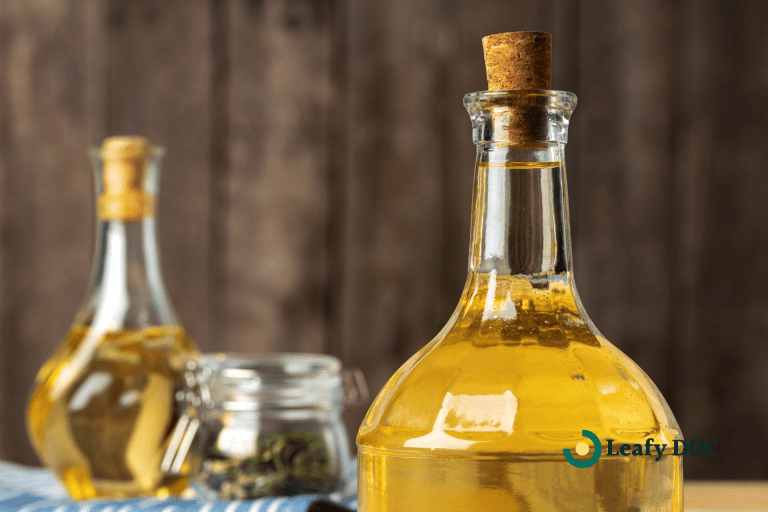Does Smoking Cannabis Give You High Blood Pressure?
by Haley Mills · October 3, 2022
Can cannabis help manage high blood pressure? Discover our informative article about the potential benefits of using cannabis for hypertension.

One in three adults in the United States has high blood pressure, leading to cardiovascular disease and increased risk of stroke, heart attack, and heart failure. Per the National Heart, Lung, and Blood Institute, several factors increase that risk, including stress, poor diet, physical inactivity, and alcohol and tobacco use. While older adults are more at risk for developing hypertension, it can also occur in young adults.
Research shows a connection between cannabis use and lowering blood pressure for some; however, some studies suggest weed may increase your risk for higher blood pressure. Let’s weigh the benefits and risks of cannabis, blood pressure, and heart health below.
What is blood pressure?
Blood pressure is the force of your blood pushing against the walls of your arteries. Every time your heart beats, it pumps blood into your arteries. Blood pressure is the force of that blood pushing against the artery walls.
Per the American Heart Association, our blood pressure is highest when the heart beats. This is called systolic blood pressure. When your heart is resting, your blood pressure falls between beats, known as diastolic pressure.
What is hypertension?
Hypertension is simply another word to describe blood pressure that is too high to be safe in the long term. In some cases, it can lead to heart disease, damage to blood vessels, heart attack, or stroke.
The Importance of Blood Pressure Regulation
When your blood pressure is high, you are three times more likely to die from heart disease and four times more likely to die from a stroke. Even a slight increase in blood pressure can put you at significant risk. Most people with high blood pressure or are at risk for developing hypertension see their doctor regularly to monitor it and take prescribed medicine to regulate it.
Blood Pressure Statistics in the US
Here, we have the most recent statistics from the CDC regarding high blood pressure among United States citizens.
- Hypertension puts you at risk for heart disease and stroke, leading causes of death in the United States.
- In 2020, more than 670,000 deaths in the United States had high blood pressure as a primary or contributing cause.
- Nearly half of adults in the United States have hypertension, defined as a systolic blood pressure greater than 130 mmHg or diastolic blood pressure greater than 80 mmHg, or are taking medication for hypertension.
- Only about one-fourth of adults with hypertension have their condition under control.
- About half of adults with uncontrolled hypertension have a blood pressure of 140/90 mmHg or higher.
- High blood pressure costs the United States about 131 billion USD yearly, averaging over twelve years from 2003 to 2014.
- A more significant percentage of men have high blood pressure than women.
- High blood pressure is more common in non-Hispanic black adults than in non-Hispanic white adults, non-Hispanic Asian adults, or Hispanic adults.
- Among those recommended to take blood pressure medication, blood pressure control is higher among non-Hispanic white adults than in non-Hispanic black adults, non-Hispanic Asian adults, or Hispanic adults.
High vs. Low Blood Pressure
A health care professional can attribute hypertension to the following factors that may increase the risk:
- Aging
- Alcohol Consumption
- Diabetes
- Genetics
- High Salt Intake
- Obesity
- Smoking tobacco
- Stress
Certain conditions cause hypotension, such as:
- Blood loss due to injury
- Bloodstream Infections
- Dehydration
- Diabetes
- Thyroid
- Pregnancy
What are the symptoms of each?
High blood pressure symptoms include:
Lower blood pressure symptoms include:
- Blurred vision
- Clumsiness
- Decrease in concentration
- Depression
- Fatigue
- Nausea
- Pale skin
- Rapid breathing
Does cannabis raise blood pressure?
Does marijuana affect blood pressure? Studies show that occasional users will experience a mild to moderate increase in blood pressure and heart rate shortly after use, followed by a similar blood pressure reduction. Elevated heart rate and blood pressure occur within fifteen minutes of consumption.
So, marijuana’s effect is not significant or long-term; however, the results of cannabis on blood pressure are dose-dependent, and risks can increase with frequent and long-lasting use. More research is needed to know if smoking marijuana poses the same health risks as smoking tobacco.
Can weed help lower blood pressure?
Many patients report that the long-term effects of cannabis help them maintain adequate blood pressure levels. Recent research shows that anandamide, the body’s natural version of THC, relaxes blood vessels, allowing blood to flow more freely to lower blood pressure.
The National Institute on Alcohol Abuse & Alcoholism published a report stating that “endocannabinoids tonically suppress cardiac contractility in hypertension” and “targeting the endocannabinoid system offers novel therapeutic strategies in the treatment of hypertension.”
Does marijuana use cause heart problems?
Cannabinoids are found in the cannabis plant and are also produced naturally by our bodies. Humans have an endocannabinoid system that organically produces cannabinoids. These compounds are essential to maintaining internal balance through many different body systems.
Cannabinoids interact with our ECS to help maintain homeostasis through a messenger system of molecules and receptors. Sleep, energy, cardiovascular health, reproduction, stress, chronic pain, motivation, appetite, digestion, and more are some bodily functions that cannabinoids impact.
According to the Diagnostic and Statistical Manual of Mental Disorders — published by the American Psychiatric Association — the following criteria are indicative of potential marijuana abuse:
- Prolonged marijuana use despite physical or psychological distress
- Prolonged marijuana use despite social or relationship problems
- Marijuana cravings
- Difficulty controlling or reducing cannabis use
- Prioritizing cannabis in favor of other activities
- Causing harm at work, school, and home as a result of marijuana use
- Marijuana use dominates one’s daily schedule
- Risky behaviors during/after marijuana use
- Using more cannabis than is typical
- Cannabis tolerance
- Cannabis withdrawal symptoms such as emotional distress or severe agitation (irritability/anger/depression), difficulty sleeping, and decreased appetite
Best Ways to Consume for Heart Health
While smoking cannabis may not be best for those with a family history of heart issues, diabetes, hypertension, or immune disorders, there are many other ways to consume more healthily. Weed can come in many forms, such as baked edibles, hard candies, cannabis-infused oils, tinctures, capsules, beverages, and gummies.
Although more research is needed, we do know that cannabis can have significant health benefits when used correctly. However, it is essential always to purchase products from a reputable dispensary to ensure that your cannabis products are safe and effective.
Top Cannabis Products for Hypertension
In the United States, there is limited legality of cannabinoids as medicine on a federal level. Currently, three medications contain lab-created THC that is Food and Drug Administration (FDA) approved for therapeutic uses. Epidiolex, a drug made from CBD, has been approved to treat epilepsy and seizures associated with Lennox-Gastaut syndrome or Dravet syndrome in patients over two years old.
CBD derived from a hemp plant that contains less than 0.3% is legal on a federal level. CBD products made from cannabis are permitted by specific state laws, depending on their recreational and medical marijuana laws. Below we include a few products that may be safe and legal in your area as a treatment for heart health.
Here are a few heart-friendly cannabis products:
- Charlotte’s Web CBD Oil
- Joy Organics CBD Gummies
- NuLeaf Full Spectrum CBD Capsules
- CBDfx Calming Tincture
- Spruce Full Spectrum CBD oil
Getting a Medical Marijuana Card Online
Applying for a medical marijuana card can be an intimidating process. For many people getting to a physical office to go through an evaluation or recertification can be a very trying experience. Historically when medical cannabis programs were first starting, appointments could take an entire day.
As medical marijuana programs have grown with technology, so has the application process for an MMJ card. It is now possible to apply for and obtain a medical cannabis card online in some areas. This is an option that is quite convenient, especially for a medical marijuana patient who may have mobility or transportation issues.
Each state has different medical marijuana card application requirements. In some states, it can take several weeks to even a whole year to obtain a medical marijuana card. When available, applying for a marijuana card online can be much faster and more efficient. Some states will have an application fee; some will have an annual fee.
As with anything legal, the costs will be something you must keep in mind when applying for a medical marijuana card. Depending on local laws, regulations, and resources, the process for an MMJ card may be more straightforward in some states than others. This goes for both online and in-person aspects of patient registration and application.
Final Thoughts
The jury is still out on how much, or little marijuana use can affect blood pressure, but some promising studies suggest it may be able to help lower blood pressure and heart rate for some patients. As with most medications, moderation and regulation are critical, and discussing any changes with your doctor is essential.
Last Updated: January 29, 2025
Get Approved for Your Medical Marijuana Card in Minutes!

Get Your Medical Card
Connect with a licensed physician online in minutes

Like This Article?
Share with your friends
Table of Contents
Keep Reading
-
Is Delta 9 Synthetic?
Unveiling the Truth: Is Delta 9 Synthetic? Get ready to be astonished as we delve into the hidden side of this controversial substance. Don’t miss out on uncovering the shocking secrets – click now!
-
Examining The Respiratory Effects Of Medical Marijuana
Uncover the Impact of Medical Marijuana on Your Respiratory System. Don’t miss out on these surprising findings! Click now for essential insights and protect your respiratory health.
-
Unlocking Flavor: How to Make Cannabis Infused Olive Oil for Cooking
Learn how to make cannabis-infused olive oil at home using simple ingredients and easy-to-follow steps. Perfect for cooking, baking, and enhancing your favorite recipes with THC or CBD.



